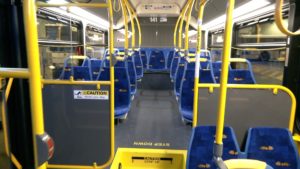Westchester steps to the front with a new electric bus
Yonkers-based Liberty Lines and the Westchester County Bee-Line bus system it operates were among the New York Metro area transit services that had to shut down the night of Sept. 1 and into Sept. 2 because of the torrential rains from the remnants of Hurricane Ida.
There was extensive road flooding and traffic gridlock, with route detours expected to continue as the storm clean-up progressed. The disruption gave bus system and county officials an extra day to ponder the arrival of the first of six all-electric buses for the Bee-Line fleet. A welcoming ceremony for the new vehicle had been held at the Bee-Line bus depot in Valhalla before the rains came.
The buses are manufactured by New Flyer, a subsidiary of NFI Group, the largest transit bus manufacturer in North America. Its primary factory is in Anniston, Alabama.
The all-electric buses are powered by high-energy batteries and a full charge that can keep the buses running for about 200 miles takes just about four hours. The batteries are made using a combination of lithium, nickel, manganese and cobalt.

The first of the all-electric buses is 35 feet in length. There will be another 35-footer, and the remaining four all-electric buses in the county”™s order will be 40 feet in length. The first bus had a price tag of $969,028. The New York State Energy Research and Development Agency is providing a total of $1.3 million to help pay for four of the buses.
The New York Power Authority (NYPA), which has its headquarters in White Plains, is installing six electric vehicle chargers within the bus depot. NYPA”™s $1.7 million project includes $682,000 obtained from the Volkswagen diesel emissions settlement and provided to NYPA by the New York State Department of Environmental Conservation.
The first bus has 32 seats and by being all-electric is expected to avoid burning approximately 5,000 gallons of diesel fuel each year. It features USB charging ports for passenger use at every seat, a bike rack, 14 cameras for added security and a protective shield for the driver.
The Bee-Line currently has 325 buses in its fleet, 177 of which are hybrid diesel-electric. The county is due to get 106 more next year so all buses in the fleet will then have at least some electric propulsion capability.
“We”™re known as a suburban county and yet we still have people that need public transit to get from point A to point B,” Westchester County Executive George Latimer said. “We also know that we have to be good stewards of the environment. We”™re in the process now of transforming our bus system from a diesel system to an electric and electric-hybrid system. This is another step in that process.”
Hugh Greechan, the county’s public works commissioner, said that the all-electric bus has been vetted to ensure that its heating and air conditioning will function at the highest and lowest air temperatures experienced in Westchester County and will provide a comfortable environment for riders.
“It”™s a great bus — it performs well,” Greechan said.
The Bee-Line system, serves more than 27 million passengers using about 60 routes that have more than 3,300 bus stops.